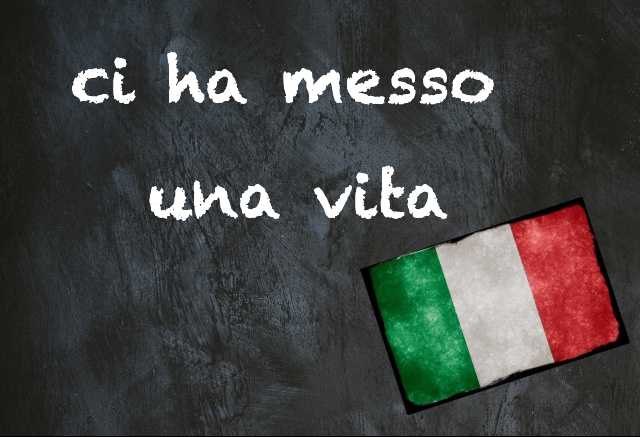
Italian expression of the day: 'Ci ha messo una vita'

It won't take you a lifetime to master this simple phrase.
From completing a simple bureaucratic task at the comune to waiting for the bus, sometimes it feels like things can take forever in Italy.
Fittingly, there's a phrase for that: Ci ha messo una vita (chee-ah-MESS-oh-oo-nah-VEE-ta). It translates literally as 'it took a lifetime', or as we'd be more likely to say in English, 'it took forever'.
L'autobus ci ha messo una vita ad arrivare.
The bus took forever to get here.

Ci ha messo una vita can mean 'it took forever' or 'it took him/her forever' - the meaning is understood from context.
Ci ha messo una vita per chiederle di uscire.
It took him forever to ask her out.
Sono appena uscita dalla banca, ci ha messo una vita.
I just got out of the bank, it took forever.
The messo (past participle of mettere) stays the same regardless of the sentence subject - but you can conjugate the avere differently depending on your subject to say 'it took me/you/them/us forever'.
Ci ho messo una vita a risparmiare per questa vacanza.
It took me forever to save up for this holiday.

Ci hai messo una vita a fare la doccia.
You took forever in the shower.
Ci hanno messo una vita ad alzarsi.
It took them ages to get up.
You'll notice that the phrase can be followed by either a or per directly before the verb, and the expression doesn't just work with una vita - you can switch that out for any time period, from a minute to a week to a year.
Ho fatto una domanda al comune e ci hanno messo un mese a rispondere.
I wrote to the comune and it took them one month to get back to me.
Ci abbiamo messo una settimana per trovare le piastrelle che volevi.
It took us a week to find the tiles you wanted.
You're not restricted to the past tense: ci mette (along with the slightly more common ci vuole) can mean 'it takes' when followed by any time duration, and can also be conjugated in the future tense.
Ha detto che ci mette un'ora per arrivare in centro con l'autobus.
She said it takes an hour to get to the centre by bus.
Ci metterai 5 minuti per riscaldare gli avanzi che ti ho lasciato in frigorifero.
It'll take you 5 minutes to heat up the leftovers I left in the fridge for you.
Have a go at mastering all the different variations of this phrase - we bet it won't take you long!
Do you have an Italian word you’d like us to feature? If so, please email us with your suggestion.
Comments (1)
See Also
From completing a simple bureaucratic task at the comune to waiting for the bus, sometimes it feels like things can take forever in Italy.
Fittingly, there's a phrase for that: Ci ha messo una vita (chee-ah-MESS-oh-oo-nah-VEE-ta). It translates literally as 'it took a lifetime', or as we'd be more likely to say in English, 'it took forever'.
L'autobus ci ha messo una vita ad arrivare.
The bus took forever to get here.

Ci ha messo una vita can mean 'it took forever' or 'it took him/her forever' - the meaning is understood from context.
Ci ha messo una vita per chiederle di uscire.
It took him forever to ask her out.
Sono appena uscita dalla banca, ci ha messo una vita.
I just got out of the bank, it took forever.
The messo (past participle of mettere) stays the same regardless of the sentence subject - but you can conjugate the avere differently depending on your subject to say 'it took me/you/them/us forever'.
Ci ho messo una vita a risparmiare per questa vacanza.
It took me forever to save up for this holiday.

Ci hai messo una vita a fare la doccia.
You took forever in the shower.
Ci hanno messo una vita ad alzarsi.
It took them ages to get up.
You'll notice that the phrase can be followed by either a or per directly before the verb, and the expression doesn't just work with una vita - you can switch that out for any time period, from a minute to a week to a year.
Ho fatto una domanda al comune e ci hanno messo un mese a rispondere.
I wrote to the comune and it took them one month to get back to me.
Ci abbiamo messo una settimana per trovare le piastrelle che volevi.
It took us a week to find the tiles you wanted.
You're not restricted to the past tense: ci mette (along with the slightly more common ci vuole) can mean 'it takes' when followed by any time duration, and can also be conjugated in the future tense.
Ha detto che ci mette un'ora per arrivare in centro con l'autobus.
She said it takes an hour to get to the centre by bus.
Ci metterai 5 minuti per riscaldare gli avanzi che ti ho lasciato in frigorifero.
It'll take you 5 minutes to heat up the leftovers I left in the fridge for you.
Have a go at mastering all the different variations of this phrase - we bet it won't take you long!
Do you have an Italian word you’d like us to feature? If so, please email us with your suggestion.
Join the conversation in our comments section below. Share your own views and experience and if you have a question or suggestion for our journalists then email us at [email protected].
Please keep comments civil, constructive and on topic – and make sure to read our terms of use before getting involved.
Please log in here to leave a comment.